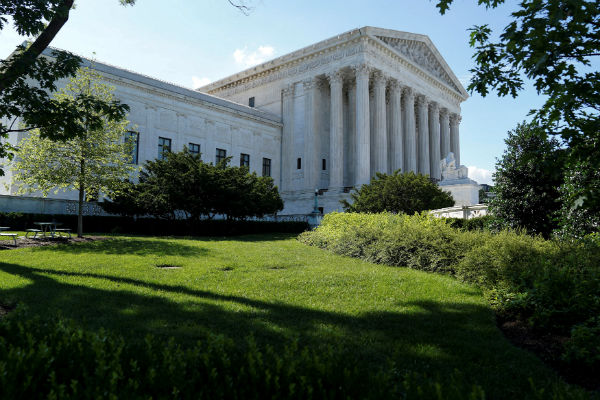'Big loss for the coffers of the Democrats!': Trump tweet

WASHINGTON (Reuters) — The U.S. Supreme Court on Wednesday dealt a blow to organized labour, ruling that non-members cannot be forced in certain states to pay fees to unions representing public employees such as teachers and police, shutting off a key union revenue source.
The 5-4 ruling — with the conservative justices prevailing and the liberal justices dissenting — overturned a 1977 Supreme Court precedent that had allowed so-called agency fees that are collected from millions of non-union workers in lieu of union dues to fund non-political activities like collective bargaining.
The court ruled that forcing non-members to pay these fees to unions whose views they may oppose violates their rights to free speech and free association under the U.S. Constitution’s First Amendment.
“This case was nothing more than a blatant political attack to further rig our economy and democracy against everyday Americans in favour of the wealthy and powerful,” public-sector unions including the American Federation of State, County and Municipal Employees (AFSCME), the union directly involved in the case, said in a statement.
Two dozen states have required agency fees. The ruling means that the estimated five million non-union workers for state and local governments who have paid these fees can stop. Agency fees do not involve federal employees or private-sector workers.
The decision represented a major victory for conservative activists who long have sought to curb the influence of public-sector unions that often support the Democratic Party and liberal causes. It deprives unions of a vital revenue stream, undercuts their ability to attract new members and undermines their ability to spend in political races.
Republican President Donald Trump, whose administration backed the challenge to the fees, welcomed the ruling, writing on Twitter, “Big loss for the coffers of the Democrats!”
The court overturned the high court’s ruling 41 years ago in a case called Abood vs. Detroit Board of Education.
Writing for the court, conservative Justice Samuel Alito said that while the ruling “may cause unions to experience unpleasant transition costs in the short term” that must be weighed against “how many billions of dollars have been taken from nonmembers and transferred to public-sector unions in violation of the First Amendment.”
Alito said that the “legal and economic backdrop” has changed since the 1977 ruling, noting that rise of unions led to increases in public spending, and subsequently to problems funding benefits packages. This is turn contributed to municipal bankruptcies, Alito added.
In a dissent, liberal Justice Elena Kagan wrote that the ruling gave scant regard to the court’s usual way of evaluating when to overturn a long-standing precedent.
Kagan, who read forcefully from her dissenting opinion in the packed courtroom, said the practice of separating union political activities from collective bargaining-related spending, set by the court in the precedent overturned on Wednesday, had been a workable solution.
“There is no sugarcoating today’s opinion. The majority overthrows a decision entrenched in this nation’s law — and in its economic life — for over 40 years. As a result, it prevents the American people, acting through their state and local officials, from making important choices about workplace governance,” Kagan said.
The court’s conservative majority, Kagan said, was “weaponizing the First Amendment” to intervene in economic and regulatory policy.
Unions contend that mandatory agency fees are needed to eliminate the problem of what they call “free riders” — non-members who benefit from union representation, for example through salary and working conditions obtained in collective bargaining — without paying for it.
Unionized teachers, police, firefighters and other civil servants in states without Republican-backed “right-to-work” laws barring agency fees comprise organized labour’s main power base. Public-sector workers are almost six times more likely to belong to a union than those in the private sector.
Unions have worried that a ruling throwing out the fees would give workers less incentive to join because they would get the benefits of collective bargaining without having to pay for it. Fearing they would lose the case, unions already have taken steps to try to shore up membership.
The decision was issued on the final day of the court’s current term, which began in October, and came a day after the conservative justices gave Trump another victory, upholding his travel ban targeting several Muslim-majority nations.
Richard Trumka, president of the AFL-CIO labour federation, said the ruling was a “political stain on what is intended to be the most honorable, independent body in the world.”
The plaintiff in the case is Mark Janus, a child-support specialist for the state of Illinois who opted not to join AFSCME. A lower court had ruled against Janus, setting up the Supreme Court showdown.
The justices heard arguments in a similar case in 2016 involving non-union public-school teachers in California, and appeared poised to overturn the 1977 precedent. But the death of conservative Justice Antonin Scalia weeks later left the court with an even split of conservatives and liberals, and its 4-4 decision in March 2016 failed to resolve the legal question.
Trump’s appointment of Justice Neil Gorsuch last year restored the Supreme Court’s conservative majority, and Gorsuch’s vote proved to be crucial on Wednesday.
“Today’s decision ensures that American workers in the public sector retain their First Amendment freedom to support only the organizations and speech of their choice,” Justice Department spokeswoman Kerri Kupec said.
Janus was backed in the legal fight by anti-union groups including the National Right to Work Legal Defense Foundation and Liberty Justice Center. Janus has said he is not a member of a political party and his objection to the fees was not based on politics. Janus had been forced to pay just under $50 a month in agency fees since starting his current stint working for Illinois in 2007.




